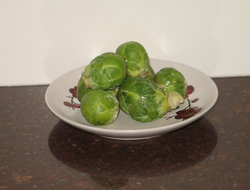Brussels sprouts: Good things come in small packages
Published: February 16, 2023
The Brussels sprout is not everybody’s favourite vegetable and some people may find the nutty sweet flavour bitter.
However, each little green bud packs a powerful nutrient content similar to that of other green leafy vegetables.
As a member of the Brassicaceae species, the Brussels sprout is one of several cultivars which are identified as cruciferous.
The shape of the four petals of the flower in these cultivars resemble a cross.
Brussle sprouts are a source of vitamin A, vitamin C, vitamin K, folic acid, potassium, iron and dietary fibre, all essential for good health.
Brussels sprouts are also thought to contain phytonutrients such as lutein which may defend against some cancers.
If you looking for a low calorie addition to your meal 1 cup of cooked Brussels sprouts may fit the bill.
Despite their favourable nutrient composition, Brussels sprouts are not the most popular of vegetable.
Some varieties do have a strong bitter taste.
Research has identified glucosinolates, a class of phytochemicals, which are thought to be associated with bitterness.
Glucosinolates comprise a group of compounds, glucobrassicin, gluconapin, sinigrin, and glucoiberin, found in Brussels sprouts and other brassicas.
Scientists have been able to reduce the amount of glucosinolates in certain Brussels sprout varieties which reduces bitterness and improves health attributes of the vegetable.
In common with other brassicas, Brussels sprouts (and broccoli) contain abundant amounts of the phytochemical sinigrin.
Sinigrin is thought to defend against cancers such as colon cancer.
In addition, sulforaphane which is thought to defend against cancer, and indole-3-carbinol which is involved in DNA repair and which may also inhibit...
Follow the link to the full article to view the “Brussels sprout nutrient content table” and to learn more about the nutrient content (carbohydrate, protein, fat, vitamins and minerals) of this tasty vegetable.

